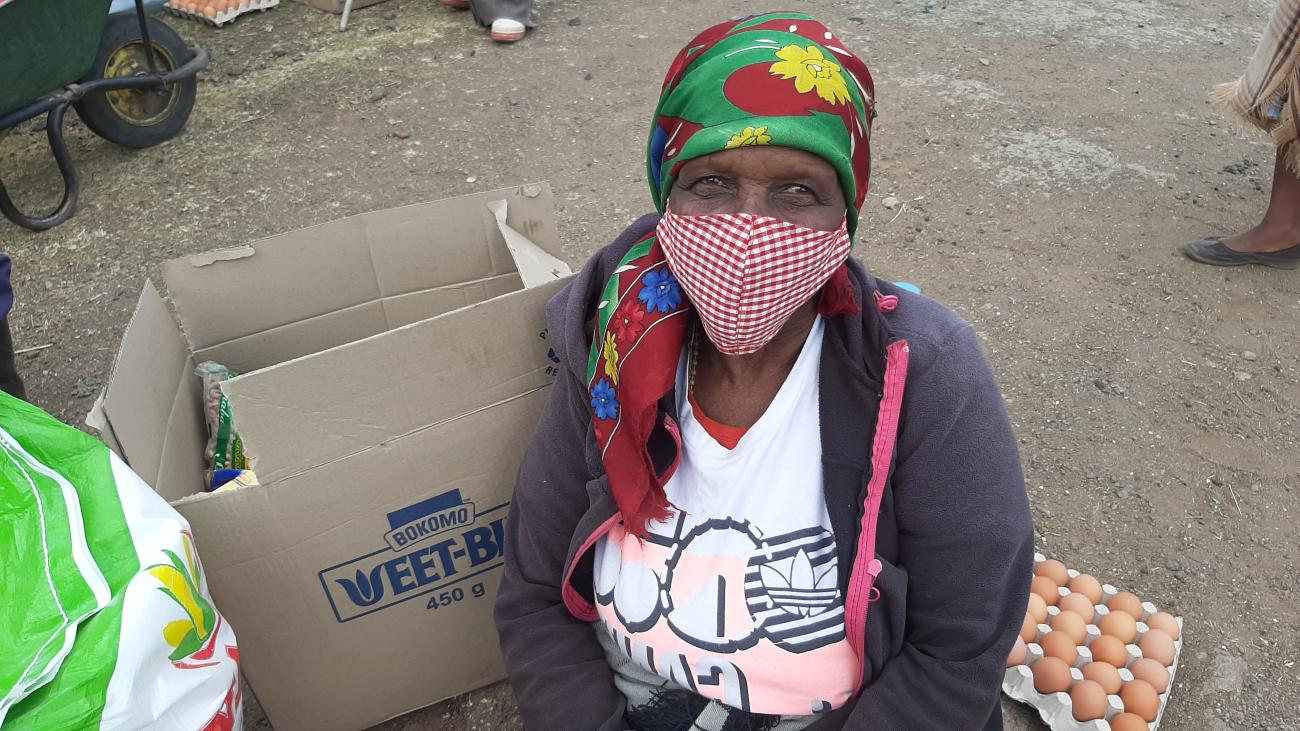“I no longer have to rely on my children for food...”

Mokhotlong, one of the districts where WFP has ongoing emergency food assistance to offset the impact of the drought...
In Lesotho, many families go hungry during the lean season (between October and March). This is called the ‘lean season’ when food runs out before the new harvest comes.
The sharp, cold wind sweeps over the escarpment cutting through an otherwise sunny, pleasant day in Ha Mojakisane; Phatlalatsa village in the district of Mokhotlong, one of the districts where WFP has ongoing emergency food assistance to offset the impact of drought.
Today is distribution day and the village is teeming with activity. Families from across the area make their way to Mr. Nkhahle’s shop, a contracted WFP local retailer.
Maseribane , is the head of her family and receives WFP's drought emergency assistance. Sitting outside her house, savouring the warmth of the sun, she explains that her life is a constant struggle — at the age of 68, she is the sole provider for her five grandchildren who range in age from 3 to 12.
“I have nine surviving children, who are also struggling to make a living and some have migrated for work and only come home once per year,” she says. “Its hard to rely on them for food and other households requirements when they are also struggling to provide for their families.”
Lesotho is extremely vulnerable to climate change and the past few years have been plagued by drought and poor harvests. The Lesotho Vulnerability Assessment Committee (LVAC) conducted a rapid assessment in May 2020 and projected that the number of food insecure will rise to 380,000 people from July to September 2020. The number has more than doubled to 582,000 people considered severely food-insecure and in need of humanitarian assistance between October 2020 and March 2021.
Maseribane owns a vegetable garden but has not planted anything due to drought and lack of money to buy vegetable seeds. “I do not own a field, I only have this vegetable garden. But this season, I had no money to buy seeds as business was not good and there were few jobs working in other people’s fields.”
Maseribane and her family are among some households that receive monthly drought emergency assistance from the World Food Programme (WFP) thanks to donors such as the USAID/FFP. Each household received USD 54.75 per month through cash or commodity voucher that beneficiaries can exchange for a nutritious food basket comprising of maize meal, flour, protein (eggs, tinned fish, milk) and iron-rich foods (split peas, beans, wholegrain cereals); all redeemable at a contracted local retailer shop while cash is offered through Vodacom Mpesa mobile money to allow beneficiaries the flexibility to buy other foods and non-food essential items.
COVID-19 is adding to the woes of people like Maseribane. As schools across the country are closed to contain the spread of the disease, children — including four of her grandchildren — are not receiving their daily school meal, which places further strain on food insecure families.
Before receiving the assistance, her life was a daily struggle, she relied on selling home-brewed beer for a living. At times, she relied on odd jobs and these were hard to find in her neighbourhood since the implementation of COVID-19 lockdowns in March 2020.
For this loving grandmother, the assistance she receives is easing her mind from the constant worry of what she will put on the table every day.
“I am so grateful for the assistance that I receive from WFP because I no longer have to rely on my children for meals and this is also a relief to them. Together with my grandkids, we are able to eat healthy meals every day and I am able to save the little that I make from my business for other household items. I wish that every family in Lesotho could have this privilege. At my age, it is my wish that in the future, my grandchildren do not have to constantly worry about what they will eat. When you are hungry, you cannot think of much else, your mind is always consumed,” Maseribane concludes.








